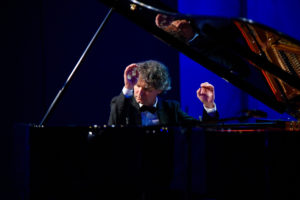Gershwin | Bizet
With:
Paweł Kowalski – grand piano
Jerzy Semkow Polish Sinfonia Iuventus Orchestra
Mirosław Jacek Błaszczyk – conductor
Programme:
George Gershwin – Piano Concerto in F Major [31′]
intermission
Georges Bizet – Suite No 1 from L’Arlésienne [17′]
Georges Bizet – Suite No 2 from L’Arlésienne [18′]
The life of a piece of incidental music is often ephemeral – it does not outlast the run of a specific theatrical play for which it was written. Yet there are some exceptions from this rule. L’Arlésienne (also known as The Girl from Arles) is a play based on a novel by an eminent French writer Alphonse Daudet, an eulogist of beauty and the culture of Provence. It tells a melodramatic story of obsessive love of a young man called Fédéri for a mystery lady from Arles, who may be a figment of his imagination, but makes him neglect the feelings of his betrothed, Vivette. During the Paris première in 1872, the composer himself played the score (consisting of as many as 27 numbers)… on the harmonium. After the play’s fiasco, he arranged four particularly impressive fragments for an orchestra, featuring, inter alia, themes from Provençal folk music. After Bizet’s premature death, his friend, Ernest Guiraud, collated the second suite on the basis of surviving drafts. In time, both spectacular and colourful cycles turned out to be a major success and built up fame of the author, who had died at 37 in poverty, grief-stricken and with a sense that he had been completely underrated…
With the American composer George Gershwin, Bizet shared both his first name and nearly the same age at which both authors, all too soon, died – yet the similarities end here. Gershwin rose quickly to fame and recognition as a composer who, in an original approach, introduced elements of jazz into his symphonic and operatic music. This is also a characteristic of his Concerto in F Major, composed (1925) right after the immensely successful Rhapsody in Blue. In the intervening period of just one year between the two works, Gershwin’s talent and skills developed remarkably – the new piece, orchestrated by the author himself, is also a proof of excellent knowledge of form and facture, which was appreciated by both the audience and the critics, but also by pianists, who often include it in their repertoires.
The concerto will be performed by Paweł Kowalski, a recognised Polish pianists with a significant repertoire, ranging from the 18th to the 21st century; the conductor of the night will be Mirosław Jacek Błaszczyk, for many years the artistic director of the Polish Sinfonia Iuventus Orchestra, and presently the artistic director of the Silesian Philharmonic in Katowice. [by Piotr Maculewicz]
Ticket sales start soon!
